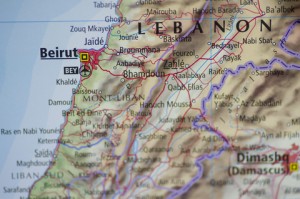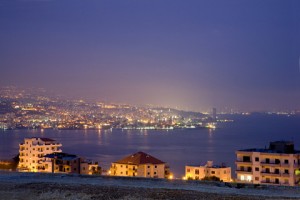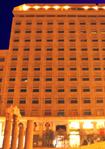
[Updated Oct 2020] A guide to serviced offices and office space to rent in Beirut as well as general information that may be useful if you are thinking of renting office space in the city.
For further offices information or to search office space for rent in Beirut just click. Or contact us for any other office space query.
History & Geography
Set on the Mediterranean Sea and flanked by the Lebanon Mountains, few cities in the world are as beautiful or ancient as Beirut. The Lebanese capital is idyllically perched on two hills on a small peninsula jutting out into the Mediterranean, on a coast made up of rocky cliffs and long sandy beaches. Beirut’s beauty is complemented by the richness and wonder of its past, one that stretches back over 5,000 years. Beirut first came to prominence as a Greek city-state and later as an important Roman city. Many of Beirut’s streets still follow the lines of the ancient Roman/Hellenistic ones. Under the Romans, the city became a prosperous trading hub and was especially known for its schools of law. The city suffered a huge blow in 551 CE when over 30,000 of its citizens were killed in an enormous earthquake which destroyed much of the city. In 635 the city fell into the hands of the Arabs but was then conquered by the Crusaders in 1110. Eventually, the city fell under the sway of the Ottoman Empire and was built up and fortified. The city came to dominate the Syrian maritime trade and grew in power and prestige. In the 19th century, Beirut developed extensive trading ties with Europe, especially France, and grew as a regional centre of commerce. In the late 19th century French engineers built a modern harbour and the city acquired running water and gas. After the collapse of the Ottoman Empire Beirut fell under the French Mandate before achieving independence in 1943. In 1975 the Lebanese Civil War destroyed much of the city and divided it between the Muslim west and Christian east. Since the end of the war in 1990 much of the city has been rebuilt and it has regained much of its prominence in the region. The 2005 assassination of former Lebanese Prime Minister Rafik Hariri and the Israeli invasion in 2006 plunged the city back into violence briefly, however peace has since been re-established.
Economy
Beirut’s economy is as diverse as the city itself, consisting of a wide array of industries and services. Publishing, banking and trade are the main bulwarks of the economy, which is mostly based on services. Banks based in Lebanon benefited greatly from the oil boom starting in the 1960s and continue to play a major role in the region’s economy. Lebanon’s main bank, Banque du Liban is headquartered in the city, as is the head office of Middle East Airlines. Many international organizations also have a presence in the city, such as the Economic and Social Commission for Western Asia, the International Labour Organization and UNESCO. The Union of Arab Banks and the Union of Arab Stock Exchanges are also based in Beirut. Education is also an important part of the economy of Beirut and the city is home to a host of higher education facilities. In particular, the Lebanese University and the famous American University of Beirut bring students from all over the world to the city. Despite its turbulent recent past, Beirut remains a popular city for tourists from both the Arab world and the West. The city’s tourism industry is once again thriving and recently the Guardian newspaper named Beirut as one of the top ten cities in the world.

Tourism & Culture
Beirut has been called ‘the Paris of the East’ and for good reason. Sitting as it does on the crossroads between three continents the city has a culture that is more diverse and rich than almost any city in the world. It is a true gateway to the East and there is a range of sites and activities to suit any visitor. In Beirut, modern buildings rub shoulders with Ottoman, Arab and French-style constructions creating a chaotic yet extremely aesthetically pleasing environment. Beirut also benefits from an idyllic Mediterranean climate and some of the best beaches in the world. Many enjoy strolling along the waterfront and stopping to sample Lebanon’s famous cuisine, especially the hummus and fresh seafood. The city, flanked by mountain ranges, is also close to several high-end ski resorts, literally making it possible to sunbathe on the beach in the morning and be skiing in the afternoon. Beirut is also famous for its nightlife and is known as the ‘party capital of the Arab world’. Monot Street is internationally renowned for its clubs and late bars, and Gemmayze and Mar Mikhael have recently become popular with clubbers as well.
Transportation
Beirut is served by the Rafic Hariri International Airport, named for Lebanon’s slain ex-Prime Minister. The airport is located in the southern suburbs of the city and is easily reachable by bus or taxi. In Beirut itself, the most favoured form of transport is the bus, which is run by the Office des Chemins de Fer et des Transports en Commun. Taxis are also a popular means of transport in the city, though a price should be agreed on before the journey begins.

Office space to rent in Beirut
Demand for office space in Beirut has been steadily climbing of late, however, supply is limited, especially in the CBD and surrounding areas. The most popular districts for offices are Hamra, Mar Elias, Verdun and Achrafieh. Verdun, in particular, is very popular as it is near the CBD. Because of the limited amount of stock, the average vacancy rate in the city generally stays below ten percent and rents have remained steady for the last year. In 2012 a study by Cushman & Wakefield ranked Beirut office space as the 31st most expensive in the world with an average cost of EUR 310 per square metre per year.
We carry out a free office space search and our advisory and acquisition services are also free, always. Our Beirut office space brokers and agents are globally regulated by the Royal Institution of Chartered Surveyors (RICS) ensuring the highest standards of commercial property advice and service at all times. We look forward to helping you find the best office space for rent for your business.

The Office Providers are Regulated by the Royal Institution of Chartered Surveyors (RICS)